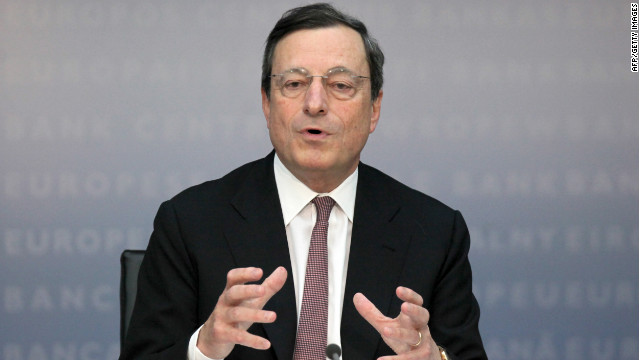
- Deterioration in the Spanish outlook threatening to engulf Italy
- Comments from ECB president have left markets, some eurozone governments hopeful that central bank will provide more help
- But ECB president's more aggressive stance has split governing council of top central bank officials
(CNN) -- With a deterioration in the Spanish outlook threatening to engulf Italy, the eurozone's monetary guardians must set aside any thoughts of the summer break when they meet in Frankfurt this week.
Comments from Mario Draghi, president of the European Central Bank, have left markets, and some eurozone governments, hopeful that the central bank will provide more help. Yields on Spanish and Italian debt fell last week after Mr Draghi signalled the ECB would buy more government bonds.
But those expecting action as early as Thursday's governing council meeting could be disappointed. The ECB will want to see more from governments, perhaps purchases of sovereign debt by the European Financial Stability Facility, the eurozone's temporary rescue fund, and a stronger commitment from Madrid to tackle its twin banking and economic crises, before it steps in.
The ECB president's more aggressive stance has split the governing council of top central bank officials.
The bond buying programme, dormant for four months, was off the agenda at recent council meetings and Mr Draghi's hints of a restart astonished some members. Germany's Bundesbank quickly objected, though Mr Draghi has the support of Angela Merkel, the German chancellor, and Wolfgang Schäuble, finance minister.
The head of the ECB will meet Jens Weidmann, Bundesbank president, before Thursday's meeting. But even if the Bundesbank does come onboard, some are sceptical more bond buying will do much good.
The ECB's stance on Greek debt could limit its ability to lower governments' borrowing costs and pass on its ultra-low interest rates to businesses and households in the periphery. The ECB, thought to have bought Greek debt with a face value of €50bn, sought special treatment when the debt was restructured. Bond market fears that the ECB would again get favourable treatment at their expense in the event of another sovereign default could stifle the impact of more action.
But optimists believe bond purchases could prove effective if the ECB were to limit the gap between Germany's borrowing costs and those of countries on the periphery.
The ECB is concerned that its recent rate cuts have been passed on to German and French borrowers but not those in Spain and Italy. An explicit cap on sovereign spreads could solve this. But it is an extreme option, which would leave the ECB bereft of power to control eurozone governments' profligacy.
Among the ECB's other options, a game changer would be for the central bank to grant the European Stability Mechanism, the bloc's firewall, a banking licence.
This would expand the ESM's capacity to buy government debt several times over the current €500bn limit by allowing the rescue fund to use its bond purchases to access more ECB cash. This would soothe fears that the eurozone lacks the resources to handle the crisis. Crucially for the ECB, ESM bond buying would come with strings attached.
Governing council member Ewald Nowotny last week raised this option. But the Bundesbank regards the granting of a banking licence as ECB funding of governments, forbidden by EU law. The ECB ruled out this idea in March 2011 and Mr Draghi indicated last month that little had changed since.
Julian Callow, economist at Barclays Capital, said: "Draghi has made it quite clear that he's against it. You have to assume the ECB isn't going to change course without an absolute crisis."
Ken Wattret, economist at BNP Paribas, said: "Nowotny's comments signal there's a willingness to talk about it. But I can't see anything being done just yet."
Another offer of cheap three-year loans is a possibility. But its impact would be limited; rising yields have stung banks who used the proceeds of previous longer-term refinancing operations to buy sovereign debt.
More effective would be to ease pressure on Spanish banks by coupling cheap loans with a relaxation of the ECB's collateral rules -- an option discussed at recent council meetings. Lower requirements for the reserves lenders must park at the central bank could also help.
August is considered too early for rate cuts. Jens Larsen, economist at RBC Capital Markets, said: "They'll wait until autumn to cut again. They want to keep some pressure on the politicians."
No comments:
Post a Comment